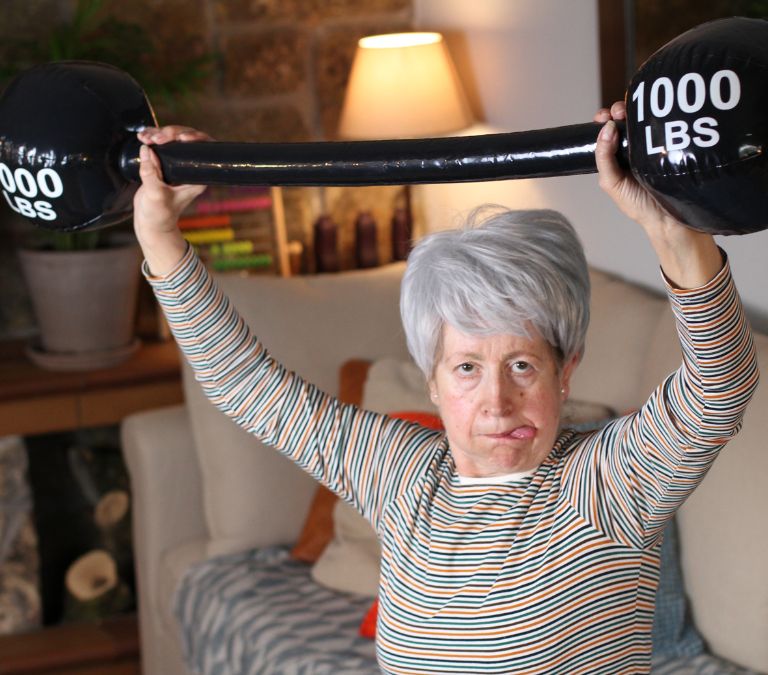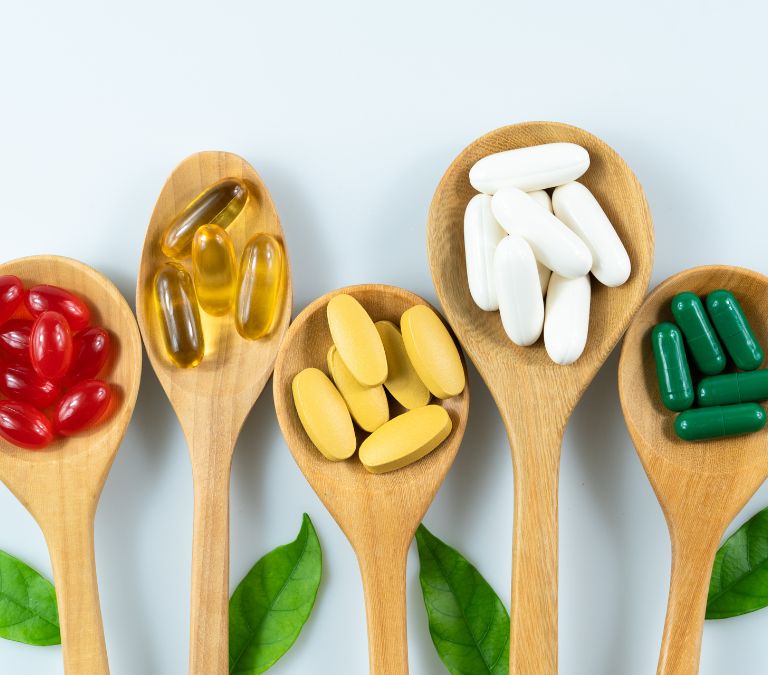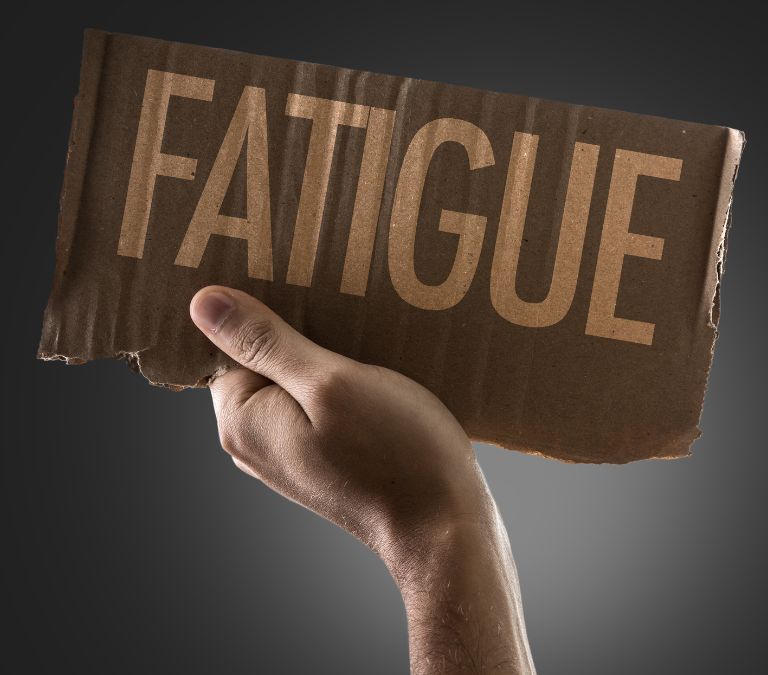Menopause is a natural cessation of menstruation due to a depletion of the egg follicles. A drop in estrogen levels accompanies it. The uterus no longer prepares for possible fertilization, and menstruation does not occur. Menopause occurs after 12 months without menses, counting from the last menstrual period. Menopause can, therefore, only be determined retrospectively.
Most women enter menopause between their 40s and 60syear of life. The age of 50 years is an estimated average. The age of menopause is an important consideration as it can provide indications about further general health. Those who enter menopause later in life have a lower risk of overall mortality and morbidity such as stroke, myocardial infarction, low bone density, osteoporosis, and fractures, but a higher risk of breast, uterine and ovarian cancer.
Premenopause is a phase where the menstrual cycle becomes very irregular. Premenopause, also called perimenopause, occurs before menopause and ends the year after menstruation has stopped. This phase can cause you to menstruate for some months and not others. The amount and duration of menstruation can also change so that you have less or more blood loss than usual and menstruate longer or shorter.
In addition to menstrual changes, premenopause also involves fluctuations in hormone production. So the symptoms of menopause are actually due to the disappearance of menstruation. Once you are through this, the symptoms will usually disappear. On average, perimenopause lasts about 3 to 4 years.
One inevitable plight of women in menopause, and it is no secret that all women will experience it. Some women see it as a big deal while others take it as it comes, but the symptoms can be devastating and especially stressful for all women. This period can be very stressful for women due to hormonal level changes, causing absent or low libido, hot flashes, night sweats, sleepless nights, and mood swings, making fatigue a significant symptom of menopause and its transition period.
The hormonal changes that lead to symptoms like profuse night sweats and hot flashes can also influence your energy levels and mood, leading to fatigue. These hormone fluctuations can also make it hard for you to sleep at night, making you feel tired during the day.
As you transition into the perimenopausal period, your hormone levels rise and fall until they eventually decrease, and your body stops making them completely.
How to Manage Fatigue during Perimenopause and Menopause

As hard as it is to find total relief from menopause symptoms, it is still possible. The major issue is finding out what works best for you as we’re all different, so what works for someone else might not necessarily go down well with you. You might have to try out several options before finding what suits you.
As much as hormone replacements help improve menopause symptoms, your doctor might not freely prescribe them to you because of the risk of breast cancer. However, one herbal remedy that has helped many women manage menopause symptoms is black cohosh. Vitamin E supplements also help cure hot flashes, but in the absence of vitamin E supplements, you can increase the vitamin E content in your diet.
It is important to note that you can handle menopause forever without using special remedies or any prescriptions, but it will take a lot of trial and mistake to finally find what works best for you.
A few practices that can help you manage menopause symptoms are:
- Get adequate sleep
Although insomnia is one of the troubles of perimenopause and menopause symptoms, help yourself by adapting a healthy sleeping routine to help you relax.
You might need to lay out an evening time routine to assist with setting the state of mind for rest. Take a bath or shower, and try not to utilize cell phones and PCs near sleep time. It’s also great practice to involve your bed for resting. Abstain from perusing, sitting in front of the TV, or utilizing your cell phone while in bed.
If you still find trouble sleeping, you should contact your doctor for prescriptions of the best medication to use to help you sleep or a special therapy that aids sleep.
- Eat healthily
Doctors advise women to eat more food rich in calcium, vitamins B and D, omega-3 fatty acids, and fiber. During menopause, we can be more inclined to food deficiencies because our hormone levels fluctuate due to our eating routine and way of life decisions. For instance, eating a lot of refined sugars and caffeine might give you an impermanent jolt of energy. However, you’ll experience that energy crash a short time later.
Low magnesium intake can add to exhaustion and lack of vitamin D, which is connected to a low state of mind and stomach upset. Furthermore, if you experience the ill effects of low vitamin D levels, taking supplements probably won’t be sufficient to battle it, especially If you also suffer from magnesium inadequacy. Why would that be? Magnesium assists with transforming vitamin D into a useful structure that the body can utilize.
Eating a healthy adjusted diet wealthy in nutrients will assist with forestalling nourishing lacks and energy lows over the day. Make certain to eat consistently, as this will prevent your blood sugar levels from falling, spiking, and encountering emotional episodes.
- Reduce or Limit Caffeine and Alcohol Intake
Caffeine and alcohol trigger menopause symptoms, so you should reduce or limit your daily intake. Your ligaments lose water as you age, which makes your body hold less water. The more water in your body, the better your body can weaken alcohol.
Alcohol influences women more than men since they, for the most part, have lower body weight. It implies they assimilate alcohol all the more rapidly.
Women additionally have lesser alcohol dehydrogenase (ADH) catalysts in their stomachs. Subsequently, their bodies can’t deal with alcohol either.
Drinking alcohol increases the chance of sleeping disorders. According to researchers, wine is also viewed as one of the most widely recognized triggers of hot flashes.
One overview found that women who drank alcohol daily were more liable to report hot flashes and night sweats. Excessive consumption of alcohol during menopause is associated with an increased chance of health conditions, for example, cancer, heart issues, liver disease, and osteoporosis. Indeed, even small amounts of alcohol can slow down certain medications. It’s important to talk to your primary care physician about the medications you take on the off chance that you plan on drinking.
To maximize health benefits and limit problems during menopause, you need to adopt a routine like ‘one drink daily’ or ‘7 drinks each week’. Keep in mind that each woman is unique. Moderate drinking, or one beverage daily during menopause, can support certain women’s health. Be that as it may, it may deteriorate menopause symptoms or harm the health of others.
It’s important to talk to your primary care physician about whether it’s safe for you to drink.
- Exercise often
Different researchers have discovered that exercise has been found to help numerous areas of well-being, unlike medicine. One research disclosed that exercise could be valuable for fatigue and other menopausal symptoms, such as weight gain and hot flashes.
One more found that postmenopausal women who participate in far-reaching exercise keep a healthy body, great psychological well-being, and healthy bone thickness. The investigation further discovered that exercise helps to lower the chance of pressure, nervousness, and pessimism.
Regular exercise is the best-known therapy for improving mood and beating menopausal fatigue. You might not feel strong enough to exercise, but it is very important. Running or cycling is enough therapy for you.
- Drink plenty of water
Remaining hydrated during menopause is truly substantial. Not only will it assist with reducing weight gain, but it will also likewise assist your body with flushing out poisons and absorbing nutrients.
- Meditate often
Profound breathing exercises and meditation help to reduce pressure and beat fatigue.
Menopause accompanies mental symptoms like nervousness, stress, depression, and peevishness. Yoga mitigates all. A review distributed in the diary of Evidence-based Complementary and Alternative Medicine revealed that yoga assists menopausal women with mental issues. You can attempt profound breathing exercises and meditation to lessen stress and beat fatigue.
- Reduce your meal size
Eating too much food, especially at night, can affect your sleep. It leads to fatigue and constant weakness. It is important to reduce your meal size to help you feel lighter and allow seamless bedtime rest.
Once you reach menopause, your obstetrician will focus on two perspectives: Controlling the related symptoms and expanding your degrees of estrogen. This way, your treatment will incorporate hormonal treatment and prescriptions to manage the symptoms you are encountering. These symptoms differ from one individual to another. In this manner, the prescriptions are additionally unique. Hormone treatment should be possible through pills, patches, or infusions.
Exercises to Beat Fatigue during Menopause

Exercise is one of the most effective regular answers for menopause symptoms, yet large numbers of us get caught in a pattern of insufficiency and inaction when we want development most. Anything you do truly can have an effect. Women who exercise more can affirm the positive changes they’ve experienced.
So how would you break out of the cycle? Start little and formulate it. Yoga unwinds and assists those joints with throbbing pain. Strolling helps mindset. Numerous women in this life go through a lot to safeguard bone thickness. When exercising, do a bit, and notice how it becomes simpler and stimulating after some time. You’re simulating a body and a way of life for a long time.
- Cardio Exercise
Cardio exercise helps release feel-good endorphin, which cures mood swings during menopause. This exercise raises your heart rate, allowing your blood to pump faster. It gives you a healthier and stronger heart. It also helps reduce some weight gained during menopause due to hormonal level changes.
Some impactful cardio workout options are running, jogging, walking, or swimming for at least 30 minutes daily. However, you can download some fitness apps and participate in body bump sessions, aerobics, and Zumba. You should also go to the gym and hop on treadmills, elliptical machines, exercise bikes, and other equipment to increase blood flow into your heart.
The Rowing machine is one of the most underused appliances in the gym. However, it is one of the most valuable. Rowing is a phenomenal cardio exercise that includes all muscle gatherings: legs, back, arms, and center. You can manage how quickly you need to go and at what force.
Keeping a healthy and dynamic way of life regardless of age is crucial. Maintaining a decent way of life while moving toward menopause is particularly critical to assist with forestalling fatigue and other problematic menopausal symptoms. Normal exercise is a magnificent method for curbing fatigue by lessening pressure and helping energy levels. Rowing and cycling are a few low-effect exercises that are profoundly compelling in assisting with fatigue.
- Strength Training
During menopause, women tend to lose muscle mass and bone density, slowing metabolism. Aim for at least 30 minutes of push-ups, squats, or lunges.
Adding a few resistance-based workouts to your routine would help you build your muscles faster. In addition, it helps burn more calories while resting, reducing weight gain during menopause.
Strength training exercises assist you with strengthening the bones that have been debilitated by menopause. They additionally prevent bone damage or casualties. You should try exercises like squats and push-ups during menopause to control your chance of developing osteoporosis. It makes your bones powerless.
Menopause can prompt unpredictable heartbeats, a condition therapeutically known as arrhythmia. Shockingly, you can decrease the possibility of this condition by playing out your day-to-day family chores. Indeed, you heard us right. Vacuuming and cleaning can assist you with keeping your pulse ordinary and tracking down a growing body of exploration. These exercises need the predictable development of specific muscles of your body and strengthen them. Furthermore, they can assist you with lightening one more side effect related to menopause.
Five Foods to Help Beat Fatigue during Perimenopause and Menopause

Certain foods need to be taken during this phase of every woman’s life. While it is particularly important to eat healthily, it is vital to note some food that helps you manage your perimenopause and menopause symptoms.
Fatigue is a normal symptom during menopause as it simply tells you that your body is undergoing many energy-consuming changes. It makes you require some energy-boosting food.
Here is a list of 5 foods you should eat to beat fatigue during perimenopause and menopause.
- Eggs
Eggs are high in riboflavin which converts food to fuel and helps produce energy in the body. The protein in eggs is a major source of energy. Adding an egg to your meal will keep you energized. You can boil it and have it alone or in mashed form while also including it in specific foods and drinks preparation.
Eggs are rich in vitamin A. They also contain zeaxanthin and lutein, which collectively help prevent eye disorders. The consumption of eggs will generally strengthen most of your organs which could get weakened by age.
During menopause, you might realize excess fat around your belly and other body parts. To reduce such fat, you need to consume protein-rich food like eggs. Eggs are high in amino acids, enough to maintain and build your body mass.
Eggs are “cooling food” that helps you manage hot flashes during menopause. In addition, eggs are rich in many nutrients, so you should always opt for egg-rich food in your diet.
Mornings are the best time for omelets; in other cases, you can fry them in poached or scrambled form.
- Oatmeal
Complex carbohydrates like oats and grains help provide long-lasting energy to the body. Oats take time to release their energy, so be sure to boil them properly and avoid the regular ones with plenty of sugar.
Taking oats in the morning will help keep you energized throughout the day. You can add berries or ground nuts to your nice seething bowl of oats. However you choose to have it, you’ll be sure to feel vibrant afterward.
- Apple
Apples are not just easy to snack on; they are also packed with nutrients that give you an all-around boost.
Apples are slow-release energy fruits. They are high in fiber, vitamin C and carbohydrates, all you need for a quick energy boost.
An Apple a day doesn’t just keep the doctor away; it keeps you strong, active, and happy. You can pair your apples with cheese or peanut butter to get more protein from your snack.
- Almonds
Almonds are rich in magnesium and calcium, which help reduce fatigue. You can start your day with some almonds to improve your mood and strengthen you.
Almonds are high in protein, healthy fat, and calcium. The magnesium content in almonds will help you beat muscle fatigue. Almonds also contain vitamin B, which aids the conversion of food to energy.
- Salmon
Fatty fish like salmon is one of only a handful of exceptional foods containing vitamin D, a critical nutrient for both mindset and bone well-being. Omega-3 fatty acids can assist in withholding blood pressure levels under control. It can assist with controlling hot flashes.
Salmon is highly rich in protein, which is crucial for energy and stability. Salmons can be incorporated into your meals in many healthy ways; salmons make great salad toppings, salmons fit well with rice and pasta dishes, and salmons can be made into burgers and patties.
In addition, fish is known to help reduce mood swings, depression, impulsivity, and aggression which are common during menopause and perimenopause.
Conclusion
It is particularly important to eat healthily during your menopause transition. Knowing what to eat more is only an added advantage. A healthy diet reflects in the body as we age, and some of the problems you encounter during your menopause and perimenopause can be linked to the food you eat.
It is almost impossible to cure all menopause symptoms, but a healthy diet can help you manage them. Along with your food, drink enough water daily. Try adopting a routine like ‘one apple daily’ or ‘oats every morning’ to get better results.
Do not expect your complaints to disappear with the first healthy meal. Use the above tips as a blueprint to adjust your lifestyle in the long term. Only then will you be the woman who makes it through menopause smiling while your fellow sufferers endure long sweaty nights!
Five Foods to Avoid during Perimenopause and Menopause
As a vital stage women go through as a hormonal battle against their bodies, the importance of food is often unknown. And there are foods for menopause that are better to avoid, as well as others.
In most cases, women in menopause suffer from terrible hot flashes, irritability, tiredness, fat accumulation, and a long list of menopausal symptoms. You can soften these symptoms through the foods you eat. You can choose to avoid harmful foods.
In addition, after a certain age, the woman’s body has a greater tendency to accumulate fat. These changes are due to a decrease in the female hormones and estrogens. This imbalance generates unknown changes in the body and causes the symptoms of menopause that we have already discussed.
Misinformation makes some of these symptoms that could be softened even more complicated. Some women don’t know the type of food they should avoid.
You must know that your diet during premenopause and menopause is vital to feeling better. Especially since certain foods directly affect the most frequent symptoms.
However, there are no prohibited foods in menopause, but it is recommended to reduce their consumption precisely because they can cause more hot flashes or affect your sleep. Now that you know there are no prohibited foods, the million-dollar question is: what should you not eat during menopause?
Here is a list of five foods you should avoid during premenopause and menopause to feel better:
1. Processed foods
Yes, that York ham, crisps, deli meats, and cakes that They sell to you as healthy may be tasty, but they’re not the best options for your body. Regarding nutrition during menopause, processed foods are the first foods to cut back on. These are usually loaded with sodium and added sugars, increasing water retention and making you feel bloated.
After menopause, you are more at risk of suffering from high blood pressure because your estrogen levels decrease. It means that a less salty diet is essential! Reduce your sodium intake to help keep your body healthy.
Reducing your intake of processed foods will also help stabilize your blood sugar levels, preventing or reducing the intensity of your hot flashes. To get there quickly, stop eating prepared meals, switch from white bread to whole-grain bread, and opt for healthy snacks such as nuts and fruit instead of cookies and chips.
If you’re craving a tidbit, choose a better option, such as string cheddar, carrots plunged in hummus, or a couple of entire grain wafers with peanut butter — they’ll fulfill your need to snack without triggering any negative side effects.
Take advantage of this period of change to reclaim your kitchen and learn new recipes. In general, homemade foods are often better than store-bought, and cooking could be just the calming activity you need to get you through this time.
2. Red meat
Excessive consumption of red meat increases the drop in estrogen, just the hormone you have right now at lower levels. It automatically makes them prohibited foods in menopause. In addition, as it contains many phosphates, it increases the risk of calcium loss in the bones. Try to consume more fish and white meats such as chicken, turkey, or rabbit.
Besides being high in immersed fat, food varieties like brisket and bacon can reduce the body’s serotonin levels. When serotonin drops, we feel angry, testy, and crabby. When you’re looking for meats, avoid the oily, marbled ones for trimmer options, similar to chicken, turkey, and lean ground hamburger.
The food varieties that are great for you during menopause are great for you at any stage in your life. Assemble healthy dietary patterns now, and you’ll appreciate better well-being into the indefinite future, including through menopause.
3. Spicy foods
When it comes to diet during menopause, avoid spicy foods to help you with some of their side effects. Spicy foods can cause sweating, increasing your body temperature and hot flashes, making your symptoms much more intense. So if you’re about to add a super-spicy salsa to your fajita or opt for a spicy curry, we recommend you think twice!
If you like strong emotions, change the spicy for the acid of lemon or lime; they are better food options for menopause. Have you ever tried ceviche? Delicious and very healthy! You can always add lots of flavor with other spices, like smoked paprika, cumin, and mild curry powders, all of which add unique flavor to dishes without the heat.
4. Alcohol
Alcohol is always one of the first foods to reduce because it won’t help you lose a gram apart from its zillion calories. Its consumption increases your feeling of tiredness and heaviness.
If you’re a fan of a glass of wine in the evening, you might want to find an alternative while your body adjusts to menopause. Alcohol has several side effects. Some research has shown that alcohol increases hot flashes, and since It interferes with sleep, you may find that your fatigue worsens with too much regular consumption.
If that’s the taste you enjoy, there are plenty of non-alcoholic beers on the market that tastes great! On the other hand, it dehydrates your body and accelerates aging. Alcohol is harmful at any age, but in menopause, it is even more important to moderate or eliminate its consumption.
5. Fatty foods
If you’re looking for menopause nutrition tips to help your mood, pay attention to this one! If you like fatty foods, you’re not alone, and some fats are very good for your body and essential for keeping you healthy. But, during menopause, you might want to think a little more about the quantity and quality of fats you eat, especially those from meat.
Fatty meats like bacon and beef have been shown to lower natural serotonin levels in your body. Serotonin is one of the chemicals that keep you happy and upbeat. A drop in serotonin can make you more irritable, grumpy, sadder, and even angrier.
If you can’t do without meat, avoid fatty cuts and opt for lower-fat alternatives, such as poultry or white fish. There are also often lean alternatives to products like ground beef, which might help keep your mood more stable.
But, if you’re up for it, why not try a vegetarian diet while your body is going through some changes? Many vegetarian dishes and meat alternatives are low in fat. Watch the salt level, as it can be quite high, and the extra bloating is enough to make any woman grumpy!
In addition, the decline in estrogen after menopause increases your risk of developing high blood pressure. Reducing your sodium intake can help you lower this risk.
Finally, one more example. In a randomized study of 95 postmenopausal women, those on a low-salt diet experienced better overall mood. It contrasts with women who followed a healthy diet without salt restriction.
A healthy diet can help you find your smile. During the transition, perhaps the greatest temptation is to seek comfort in the form of comfort food. Unfortunately, this is precisely when your body craves healthy food the most. You can treat yourself now and then, but try to keep your sugar and processed carbohydrate intake to a minimum.
Always have fast, healthy food close to you by freezing leftovers at home or putting together a lunch. If you ever need to eat dinner on the outside, skip the cheeseburger and pick better menu choices. A barbecued chicken sandwich on an entire-grain bun with lettuce and tomato is decent.
The same goes for alcohol, caffeine, and high-salt foods. Get some hot ginger or peppermint tea if you desire a warm drink. On the other hand, if you need some additional energy, zoom off to a quick stroll instead of depending on caffeine for a kick.
In any case, you can consume fruits and vegetables in abundance. Try to vary this, of course, to take advantage of all the valuable nutrients nature offers!
Five Vitamins to beat perimenopause and menopause Fatigue

- Vitamin B-12
Vitamin B-12 is a water-soluble vitamin tracked down in numerous food varieties. It’s fundamental for bone well-being, DNA creation, neurological capability, and making red blood cells. As you age, your body loses a portion of its ability to absorb vitamin B-12, and your gamble of vitamin B-12 inadequacy increases. Symptoms of vitamin B-12 inadequacy are ambiguous and can include: fatigue, shortcoming, obstruction, loss of craving, numbness and shivering in the hands and feet, balance problems, discouragement, disarray, and dementia. In its later stages, vitamin B-12 lack might cause iron deficiency.
The suggested dietary remittance (RDA) of vitamin B-12 is 2.4 micrograms (mcg) daily for females 14 and more. You can assist with meeting this prerequisite during and after menopause by taking a vitamin B-12 enhancement and eating strengthened food varieties.
- Vitamin E
Vitamin E is a cancer prevention agent that helps battle cell-harming free revolutionaries in the body. Vitamin E may likewise help reduce aggravation in the body. Stress might cause cell damage and increase your chances of depression, heart disease, and weight gain. These are conditions normal to menopause.
Research has shown vitamin E helps ease stress, reduces oxidative stress, and may help reduce your gamble of depression. To increase vitamin E during and after menopause, take a vitamin E supplement and add food varieties plentiful in vitamin E to your diet.
Some food varieties that contain vitamin E are wheat germ, almonds, hazelnuts, avocado, broccoli, shellfish, squash, sunflower seeds, and spinach. Vitamin E should be used with alertness in people with Alzheimer’s and other types of cognitive decline, eye damage, kidney problems, heart problems, and skin conditions.
- Vitamin A
Vitamin A is the name for a gathering of mixtures called retinoids. Preformed vitamin A, also known as retinol, is stored in your liver. An excessive amount may be poisonous. You get preformed vitamin A when you eat animal items, fortified food varieties, or when you take vitamin A supplements. You also get vitamin A when you eat foods grown from the ground containing beta-carotene. Your body transforms beta-carotene into vitamin A as required.
Vitamin A is important for strong and healthy bones. However, taking vitamin A during menopause is quite debatable. A 2002 study trusted Source linked elevated degrees of preformed vitamin A with hip fractures in postmenopausal women. It led some to question whether vitamin A is great for your bones. After much research, it’s quite unclear how much vitamin A can threaten your bones.
However, Vitamin A retrieved from beta-carotene doesn’t increase bone fracture hazards. It can help improve bone fitness after menopause. You can help get the vitamin A you need from beta carotene by eating orange and yellow products from the soil. On the off chance that you take vitamin A supplements, don’t take more than the daily recommended value of 5,000 IU. You should find a supplement with at least 20 percent vitamin A from beta-carotene.
- Vitamin D
Your body forms vitamin D after exposure to daylight. Lack of Vitamin D may increase your chance of bone fractures, bone pain, and osteomalacia (bone softening). Even though it’s possible to do this with a diet high in vitamin D, taking a supplement may be best.
Foods that contain vitamin D include fatty fish, fish liver oils, beef liver, cheese, egg yolks, and fortified foods.
- Potassium
Potassium helps the body retain the perfect proportion of water and stays hydrated. Potassium also helps improve muscle and nerve capabilities. Milk, bananas, and tomatoes are all good sources of potassium.
Fatigue is one of the most typical symptoms of menopause. Menopausal fatigue can either be mild or severe and directly impact the quality of life. Typically caused by hormonal fluctuations, it can also be triggered by lifestyle choices, like less than stellar eating routine, stress, and lack of exercise. Certain vitamins and minerals can help prevent and manage menopausal fatigue, like potassium, vitamin C, and iron.
These vitamins and minerals work concurrently to protect the body from illnesses and improve basic capabilities.
Conclusion
- Vitamin B6 adds to the regulation of hormonal levels.
- Vitamin B12 and B6 decrease sleeping disorders and fatigue. They also improve mental ability.
- Vitamin B1 adds to the capability of the heart and nervous system.
- Calcium adds to blood thickening and muscle fitness.
- Magnesium adds to mental power and regular muscle fitness.
- Vitamin D helps you have strong bones and boosts your immune system
- Vitamin B6, B1, and Magnesium help enable proper energy-yielding metabolism.







